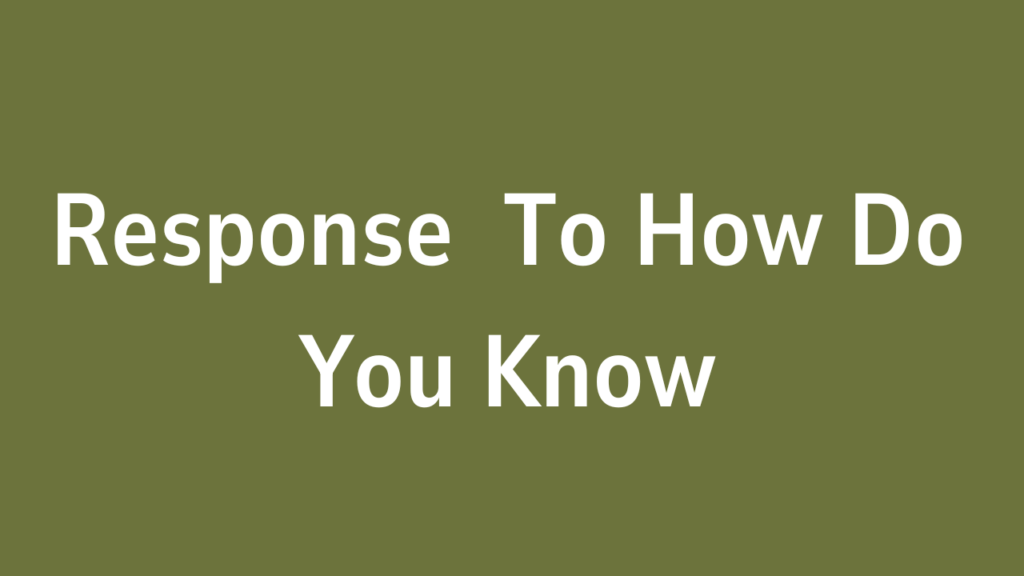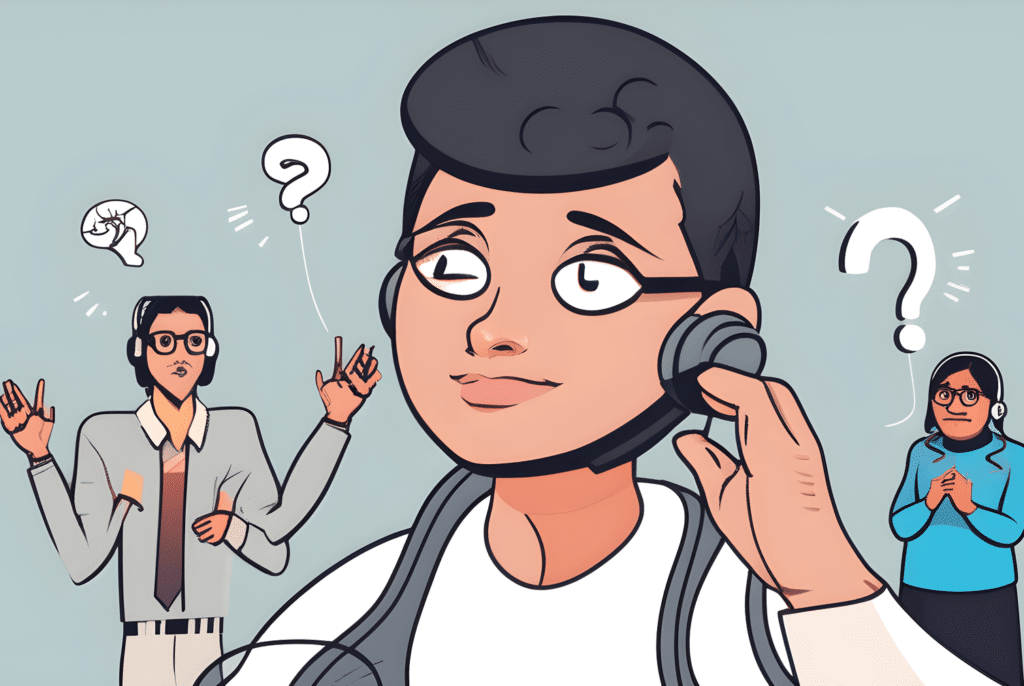When someone asks, “How do you know?” it can leave you wondering how best to respond. The question itself is simple, but the context in which it’s asked can vary greatly. Whether you’re answering a casual question, a probing inquiry, or just making small talk, the way you respond can set the tone for the rest of the conversation.
In this blog post, we will dive into different scenarios where the question “How do you know?” might arise. We will explore possible responses depending on the situation, provide humorous replies, and discuss how you can adjust your answer based on your relationship with the person asking. By the end of this post, you will have a variety of responses to choose from for every type of situation.
1. Why Do People Ask “How Do You Know?”
Before diving into how to respond, it’s helpful to understand why someone might ask this question. Below are a few reasons people commonly ask “How do you know?”:
- Curiosity: People ask this when they are interested in how you gained certain knowledge or came to a particular conclusion.
- Surprise or Skepticism: If your statement surprises them, they might ask to understand the source or reasoning behind it.
- Seeking Validation: Sometimes people want confirmation or reassurance that what you know is accurate or trustworthy.
- Casual Conversation: It can also be a simple way to engage in conversation and learn more about the source of your knowledge or experience.
The tone and intent behind the question can vary greatly depending on the context, so your response should be shaped accordingly.
2. How to Respond to “How Do You Know?”
When you’re asked “How do you know?” your response will largely depend on the context of the conversation. Whether you’re talking about personal experiences, sharing information, or making a statement, here are some ways you can respond:
2.1 Providing the Source of Your Knowledge
Sometimes, the question is just a genuine inquiry about where you learned something or how you became aware of a fact. In these cases, you can provide a clear answer to the question. Here are a few responses:
- “I read it in a book.”
- If the information came from a book, this is an easy and straightforward response. It indicates that you are knowledgeable and have done your research.
- “I heard it from a reliable source.”
- This response works well if the information came from a person or outlet you trust. It helps convey that your knowledge is well-grounded.
- “I learned it through personal experience.”
- If the knowledge is based on something you’ve gone through or experienced firsthand, this answer emphasizes that the information is rooted in your own life.
- “I saw it on the news.”
- For facts or recent events, if you learned about them through a credible news outlet, this is an appropriate response.
- “I did some research online.”
- If you’ve searched for information online, this response works well. You can always follow up by mentioning the website or database where you found the information.
These responses show that you have a legitimate reason or source for your knowledge, and they are especially useful when the person asking is looking for validation or clarification.
2.2 Humorous or Playful Responses
Sometimes, the question might be asked in a casual or lighthearted way, or perhaps you want to add some humor to the conversation. Here are some funny and playful responses:
- “I have my secret sources, but I can’t tell you—I’ve signed an NDA!”
- This playful answer adds some mystery to the conversation while keeping things lighthearted.
- “I have a crystal ball—I just knew!”
- If the question came after you predicted something correctly, this fun response can make the situation more enjoyable and whimsical.
- “I’ve got eyes and ears everywhere, don’t worry about it!”
- This response humorously exaggerates your knowledge and can be used when you want to lighten the mood.
- “A little birdie told me!”
- A classic humorous response that implies you received the information from an anonymous or secretive source.
- “I’m just that good!”
- A confident, humorous answer that turns the question into a compliment to your own abilities.
These playful responses can add humor to the conversation, especially if the situation is casual and you’re comfortable being a little silly.
2.3 Vague or Deflective Responses
In some cases, you might not want to give a detailed answer. Whether you’re not ready to share the full information or you want to avoid further questions, a vague response can do the trick. Here are some deflective responses:
- “Oh, I just know.”
- This vague answer indicates that you’re not offering further explanation, but it’s not too blunt or dismissive.
- “I can’t remember where I heard it from.”
- If you want to avoid going into specifics, this response can provide some plausible deniability without being too evasive.
- “I have my ways.”
- A mysterious response that doesn’t give much away, but still sounds intriguing.
- “It’s just something I’ve picked up along the way.”
- A vague answer that implies you’ve accumulated knowledge over time, but without offering any concrete details.
- “I just trust my gut on these things.”
- A response that implies intuition or instinct, rather than detailed knowledge or evidence.
These deflective answers can help you avoid getting into specifics when you don’t want to answer fully or don’t feel like explaining.
2.4 Philosophical or Thoughtful Responses
If you want to take the conversation in a more thoughtful direction, you could provide a response that encourages reflection or discussion about how we come to know things. Here are some philosophical responses to the question “How do you know?”:
- “Isn’t that the eternal question? How do any of us really know anything?”
- A thought-provoking response that opens up a larger conversation about knowledge and belief.
- “We all learn in different ways, don’t we? I guess I’ve just been lucky to find the right sources.”
- This response reflects on the process of learning and the importance of good sources in building knowledge.
- “I suppose it’s a mix of experience and research, but isn’t that how most knowledge is acquired?”
- This philosophical response focuses on how knowledge is often gained through a combination of personal experience and external sources.
- “I don’t know for sure, but I trust the process of learning and discovery.”
- A humble response that conveys an understanding of the uncertainty that comes with gaining knowledge, without claiming absolute certainty.
- “I think knowledge is just a matter of paying attention to what’s around you.”
- A reflective response that speaks to the value of being observant and open to new information.
These thoughtful answers can turn a simple question into a deeper conversation about how we come to know things, the nature of knowledge, and the different ways we learn.
3. Table: Responses to “How Do You Know?”
| Type of Response | Sample Response |
|---|---|
| Providing the Source of Knowledge | “I read it in a book.” |
| “I heard it from a reliable source.” | |
| “I learned it through personal experience.” | |
| “I saw it on the news.” | |
| “I did some research online.” | |
| Humorous or Playful Responses | “I have my secret sources, but I can’t tell you—I’ve signed an NDA!” |
| “I have a crystal ball—I just knew!” | |
| “I’ve got eyes and ears everywhere, don’t worry about it!” | |
| “A little birdie told me!” | |
| “I’m just that good!” | |
| Vague or Deflective Responses | “Oh, I just know.” |
| “I can’t remember where I heard it from.” | |
| “I have my ways.” | |
| “It’s just something I’ve picked up along the way.” | |
| “I just trust my gut on these things.” | |
| Philosophical or Thoughtful Responses | “Isn’t that the eternal question? How do any of us really know anything?” |
| “We all learn in different ways, don’t we? I guess I’ve just been lucky to find the right sources.” | |
| “I suppose it’s a mix of experience and research, but isn’t that how most knowledge is acquired?” | |
| “I don’t know for sure, but I trust the process of learning and discovery.” | |
| “I think knowledge is just a matter of paying attention to what’s around you.” |
4. Conclusion
The question “How do you know?” can take many forms, and your response will depend on the context of the conversation. Whether you are providing a direct answer, injecting humor into the conversation, or deflecting the question with mystery, there are countless ways to respond.
Remember, how you respond should match the tone of the conversation, your relationship with the person asking, and how much you want to share. Whether you’re offering an honest explanation, having some fun with a playful reply, or engaging in a philosophical discussion, this question provides an opportunity to shape the conversation in many interesting ways.
Next time someone asks, “How do you know?” you’ll be equipped with a variety of responses, ensuring that you can answer with confidence, humor, or thoughtfulness—whatever feels right for the moment!



